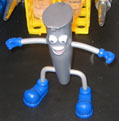 9% scored higher (more nerdy), and
9% scored higher (more nerdy), and91% scored lower (less nerdy).
What does this mean? Your nerdiness is:
Supreme Nerd. Apply for a professorship at MIT now!!!.
Purpose: to promote careers in biomedical research, science awareness, and an analytical view of the practice of medicine (and life in general). Feel free to write me at mudphudmusings.at.gmail.dot.com.
Science
30 November 1990
Volume 250
Number 4985
The Addictive Personality
Science: Dr. Noitall, you are the world’s greatest authority on addition, the seer that everyone consults, the man who got Sherlock Homes to kick his cocaine habit.
Dr.Noitall: A vast understatement of my true worth.
Science: Could you describe the addictive personality?
Dr.Noitall: An addictive person is one who has a compulsion to behave in ways that his or her family members consider detrimental to their interest. An addictive person will frequently conceal the extent of his addiction, will lie to his family about it, is immune to logical arguments to correct the error of his ways, and foregoes income that would require abandoning their addiction.
Science: Are we talking about a dope addict or alcoholic?
Dr.Noitall: No, I am describing a scientist. It is well known that work habits of scientists are addictive, leaving their spouses in tears, their children pleading, “Come home, Mommy (or Daddy),” and involve long hours in hostile instrument laboratories or cold rooms, exposed to noxious gases and radioactivity-conditions that no sane person would choose.
Science: But surely these individuals are paid handsomely for undergoing these hazardous conditions.
Dr.Noitall: This is the peculiar paradox. The profession is poorly paid because there are hundreds of applicants for every good position. Because of the psychic income that is exploited by our oppressive society, a scientist will accept pay that would make a movie star weep.
Science: But many of these individuals are academics who have the advantages of long summers off and light teaching loads.
Dr.Noitall: Academic freedom is the freedom not to take a vacation. Far from taking summers off, these individuals would rather develop films in the darkroom than sit on the beaches of Waikiki.
Science: But surely these individuals have a record of stable homes, paying their bills and other behavior not typical of an addict.
Dr.Noitall: That depends on how you define good behavior. These individuals tend to curl up with a copy of the Physical Review Letters, Journal of the American Chemical Society, or Journal of Biological Chemistry, rather than doing household chores or acting like good Americans who stay glued to the television set.
Science: So far, however you merely described an individual who works to keep his job.
Dr.Noitall: No, these individuals are definitely masochistic. They volunteer to serve on review panels that send them hundreds of incredibly detailed project proposals which must be read and evaluated. They sit through endless thesis defenses, volunteer to edit journals and serve on visiting committees for other schools when they have too much to do at home. They then complain bitterly that they are too busy.
Science: Is it apparent that these individuals could do well in other occupations?
Dr.Noitall: They are addicted to scientific logic, which makes it impossible for them to act like a trial lawyer who sues the city of New York for negligence when a drunken man falls off a subway platform, or a politician who claims one can increase services and pay lower taxes, or a movie star who testifies before Congress on carcinogens but does not know the difference between valium and valine.
Science: Is there any behavioral characteristic that can explain this obsessive conduct?
Dr.Noitall: Basically scientists have failed to grow up. They are all children, eternally curious, eternally trying to find out how the pieces of the puzzle fit together, eternally asking Why, and then irritatingly asking Why again when they get the answer to the first question.
Science: But can’t this addiction be cured by some new program or drugs and therapy?
Dr.Noitall: There is no evidence of hereditary characteristics of family environment to produce a scientist; therefore we have few handles on the potential cures, but the most glaring fact is that society cannot afford to cure these individuals. Their obsession is responsible for most of the progress of mankind and therefore the last thing we need at this moment is to turn these addictive scientists into well-adjusted television watchers. It is well worth giving them the tiny bit more money they need to stay addicted to science and to attract new compulsive personalities to their work. Society is addicted to scientists as scientists are addicted to science. – Daniel E. Koshland, Jr.
